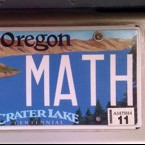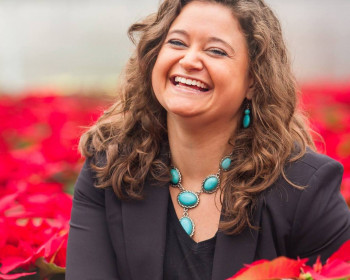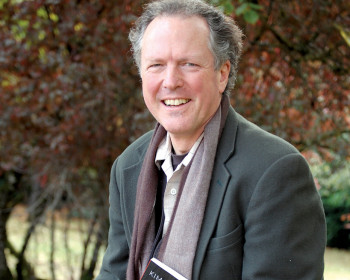DO MATH: A math educator uses her license plate to spread the word
Open gallery

One Christmas morning a few years ago, professor Kasi Allen found herself at the local DMV, renewing her registration. On this holiday morning, the lines were nonexistent and the staff jovial. The woman behind the counter asked, “Have you ever considered a personalized license plate?” Truth be told, she had.
Dr. Allen chose the words “DO MATH.” She says, “As a teacher of mathematics, I try not to forget the extent to which I am an ambassador for our discipline, for what mathematics can and should be. American society has such a pained and impoverished relationship with my favorite subject.” In a recent article in The Oregon Mathematics Teacher, Allen describes the reactions of her students and the public to her vehicular message of encouragement. Some excerpts are below.
***
As anticipated, a few of my teaching students saw the plates before I could share a photo in class. “Is that your car with the DO MATH license plates? That is so awesome. It’s like do math kids—your future depends on it.”
Throughout the day, many of my students responded in a similar vein, with their own continuations of the imperative—do math. From my pre-service elementary teachers, I heard statements like “Do math … if you’re going to be great teacher” and “Do math … I sure hope I can!”
As a group, these students preparing to be elementary school teachers tended to apply the statement to themselves, as if to say, “Yep, we all need to be doing a little more math if we are going to succeed as elementary teachers.” Their stance reflected much about their efforts to mediate some of those lingering, less-than-confident feelings about their own mathematical abilities.
From students preparing to be middle-level and high school teachers came comments with a different slant, like “Do math … and nothing can stop you!” and “Do math … if you want choices.” These soon-to-be-teachers generally applied the statement to their students as opposed to themselves, as both a source of encouragement and a bit of a threat.
While my students’ reactions to the new DO MATH plates continue to fascinate me, even more surprising (and often entertaining) have been the responses of the public. It has become fairly commonplace for people to pull up alongside me to give me the thumbs up or to shrug their shoulders with a puzzled what-the-heck-are-you-thinking look. I loved it when I was stopped by our neighborhood bank manager as I was getting into my car one afternoon. She said:
Is that your car? I’ve been wondering who drove it. I just love it because when I was in school I hated math. I thought it was stupid and worthless. And now, I use math everyday. I couldn’t do my job without it. And you know what I use all the time? The whole cross multiple thing. Who knew?
Unlike what occurs in some other cultures, children in the United States rarely get a chance to experience math as recreation or play, let alone beauty. Instead, they learn to equate mathematics with arithmetic and computation, many never recognizing math as the “science of patterns.”
My wish for every Oregonian, young and old, is to become acquainted (or reacquainted as the case may be) with mathematics as something that adds to their life rather than detracts from it … something they can DO and explore, as opposed to something that is done to them. For this reason, I want everyone to have a chance to do math and to experience the thrill that comes with it.
Adapted with permission from The Oregon Mathematics Teacher, published by the Oregon Coucil of Teachers of Mathematics.
Graduate Communications is located in room 205 of Rogers Hall on the Graduate Campus.
voice 503-768-6054
fax 503-768-6053
Graduate Communications
Lewis & Clark
615 S. Palatine Hill Road
Portland OR 97219

